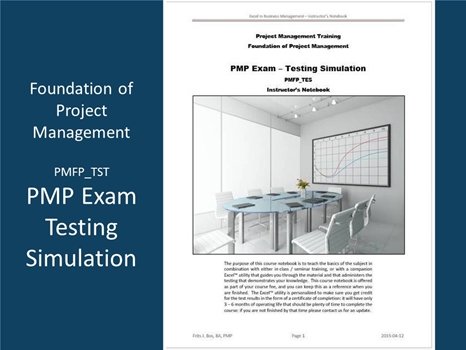
PMP Exam Testing Simulation PMFP_TST
For people who want to use self-study in order to master the PMI™ PMBoK™ in preparation for the exam, we have a simple guide to the PMBoK™ that explains the best way to pursue your studies in preparation for the exam. Our “PMP-exam 5th Edition Test Simulation” workbook is designed to simulate Prometric® type multiple choice testing using only an Excel-based macro process. An Excel™ workbook can run on any computer equipped with MS-Office, assuming that macro execution is enabled. If this workbook does not respond to clicking either function button illustrated below you must follow the instructions on setting the right security level to enable the VBA macro functionality. These materials are normally a part of the PMP Exam training we offer: we provide this testing simulation as a separate (low-cost) option for those that need it.
This is a simulation - it prepares you for the exam, but it is structured to facilitate training for the exam rather than to impose the exacting conditions of the real exam. After all, if you are not sure of the right answer then in a training mode you may prefer to look up the answer to learn what it is, rather than to take a guess. Unlike the real test, you can suspend the test, do what you have to do, and resume the test at will. If you want to experience what the real test is like then set aside the number of hours allowed for the test and commit to answering all the questions in a single sitting without stopping the clock.
- Note that this workbook has a limited shelf-life: we are trying to continuously add sample questions to make this system more powerful, so you are allotted 120 days: if that is not sufficient to be prepared, simply ask us for a fresh copy. The test simulation is not sufficient to teach you what you need to know on the exam – it is meant to be used in conjunction with a preparation course to study the materials.
- After you have finished your study sessions then you should use this simulated testing to stay mentally prepared for the exam. This is best done while the materials are still fresh in your mind - the longer you wait to take the exam the harder it is to stay primed and ready so we generally recommend the "exam cram" approach to memorize the material enough to pass the test (typically a 60% minimum score, but for training purposes you should aim for a higher proficiency of 80% or better -- that is why we try to accumulate as many questions as possible so you can retake the test exam and feel that you are realistically challenged.
For copyright reasons, you need a copy of the current version of the PMBoK™ manual – our learning guides are designed around its use with references and reading assignments, and the testing simulation is based on the exact content of this manual. We also recommend that you take out a PMI membership as well as membership in a local chapter – you get a discount on taking the PMP exam that about covers that membership. It also covers a PDF version of PMBoK™ that may come in handy if you do your studies on the road (for example, during transit commuting, or when you end up staying away from home for periods of time). That way you do not have to lug the rather bulky PMBoK™ with you wherever you go. It ensures that when you are away from opportunities to partake in PMP training classes you will have the tools to prepare yourself for the exam.
You should follow a structured study plan to master the knowledge base documented in PMBoK™, keeping in mind that the objective here is to pass the exam. This is not the time to be critical, or to point out that in your current job things are done differently. Many organizations blend a number of standard approaches that seem to yield a better result within their PMO standards, and while there is nothing wrong with that you may be getting confused about what is the right answer.
PMBoK™ includes an admonition that the methodology should not be the determining factor for how you structure a project management plan, but that you need to adapt the default methodology to make it work for a specific project. PMBoK™ provides that common standard that we can compare specific methodology against to understand exactly how best to manage certain projects with different adaptations. In order to pass the exam, however, you need to master the standard definition and be able to recall that definition to give the right answers to questions.
An important feature of this exam simulation is that by a randomizing mechanism your exam will be different each time you try the material, so there is less chance that you simply memorize the answers as with usual exam-prep materials. For that reason alone our simulation is important: a second reason is that it is a mockup of the actual Prometric exam (not an exact replica – there are copyrights around that).
Unlike on-line service providers that offer exam simulations, our Excel™-based simulation can be used anywhere – if you take a commuter train to work you can use the exam drill on your laptop and benefit from the time you have available. As the simulation is embedded in an Excel™ workbook you can take it with you on a USB stick and practice until taking tests on PMBoK™ becomes a second nature to you. Note that for every question you miss there will be a reference back into PMBoK™ so you can focus your studies on subjects that need most of your attention.
Learning Formats PMFP_TST
This course is currently available in a classroom setting (public or company private) with approximately 4 contact hours plus self-study and Exam Cram as required.
PDF – Certificate Of Completion
This course does not offer a certificate of completion.
PDF – Course Notebook
This course includes a notebook in PDF format that provides basic guidance to students aiming to complete their PMP designation. In the notebook you will find references to other study materials. Students receive the notebook by Email when their registration is confirmed.
PDF – Program Overview
An overview of this study program can be downloaded from the website by right-clicking on the program link on the enquiry page.
PDF – Current Training Schedule
A list of upcoming training sessions can be downloaded from the website by right-clicking on the schedule link on the enquiry page.
Registration – Service Providers
To register for any training course please look on the enquiry link page of your service provider (from where you accessed this website). On the page you will find a registration request form where you can order the course that you are interested in. The availability dates will be provided to you, along with payment instructions if you decide to go ahead.

 |
|